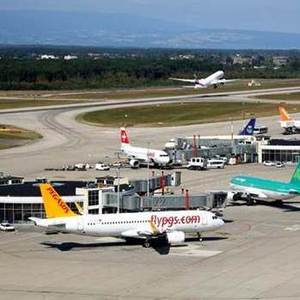Geneva International Airport to incorporate biojet fuel next year

Photo: Neste Corp.
September 13, 2017
BY Neste Corp.
Neste and Geneva Airport are pioneering together to make flying more sustainable by starting to decarbonize aviation towards fossil neutral growth. Geneva Airport is planning the introduction of renewable jet fuel for aircraft operations from Geneva International Airport; the target shall be at least 1 percent of the annual jet fuel consumption at Geneva Airport shall be composed of renewable jet fuel starting late 2018. This is an excellent example of a state, an airport and a renewable solutions provider collaborating to decrease CO2 emissions in aviation.
“Geneva Airport is exemplary in sustainability with its ambitious goals to reduce its greenhouse gas emissions,” said Kaisa Hietala, executive vice president in the renewable product business area in Neste. “We are very excited to collaborate with Geneva Airport and their airline partners to show the way to the aviation sector. We both share the common view that decreasing CO2 emissions in aviation is crucial in combating climate change. This is an important step for Neste in implementing our growth strategy for renewables in applications outside road traffic fuels. Neste MY Renewable Jet Fuel is Neste’s sustainable solution for reducing CO2 emissions in aviation.”
“As aviation is growing, airports have a crucial role in taking initiatives which aim at reducing environmental impact,” said André Schneider, CEO of Geneva Airport. “Geneva Airport is particularly pleased to work in this very ambitious project together with Neste, the Swiss authorities, airlines operating from Geneva, and locally established fuel companies.”
Aviation is the fastest growing means of transport and thus emissions will grow substantially. The International Civil Aviation Organization has set a target that from 2020 onwards the growth in aviation is carbon-neutral. Currently, the only viable alternative to fossil liquid fuels for powering commercial aircraft is sustainable renewable jet fuel, which is one the most efficient means of decreasing greenhouse gas emissions. It can be adopted immediately without the need for additional investments in new fuel distribution infrastructure.
Advertisement
For Neste, the development of Neste MY Renewable Jet Fuel has been a long journey taking several years: from building proof of concept to ensuring the quality and performance that fully meet the aviation industry's expectations. Neste’s renewable jet fuel technology and quality is proven in thousands of commercial flights and is now ready for commercialization.
With 16.5 million passengers in 2016, of whom a significant number are business travelers, Geneva Airport has a special place in European air traffic. It has a strong network of 142 direct destinations, of which 23 are intercontinental. Sustainability is one the strategic goals in the development of the airport's actions.
Advertisement
Related Stories
Airbus is taking a significant step toward scaling the adoption of sustainable aviation fuel (SAF) by testing a new “Book and Claim” approach. This initiative aims to boost both supply and demand for SAF worldwide.
Signature Aviation, the world’s largest network of private aviation terminals, has announced the expansion of its blended SAF offering at six new locations across Europe following multiple blended SAF supply agreements.
Virgin Australia has entered an agreement with Viva Energy to SAF for its flights departing from Proserpine, Queensland. The SAF will consist of Jet A1 and a 30-40% synthetic blend component made from waste and residue feedstocks.
The largest single volume order of sustainable aviation fuel (SAF) by a DB Schenker customer has been placed by Mercedes-Benz. The order is for approximately 13,000 metric tons of SAF and is expected to reduce CO2 emissions by 40,000 metric tons.
ADM and Loyola University Chicago Searle Biodiesel Lab have joined the expanding B20 Club. Founded in 2014, the B20 Club is a partnership between the Illinois Soybean Association and American Lung Association.
Upcoming Events










